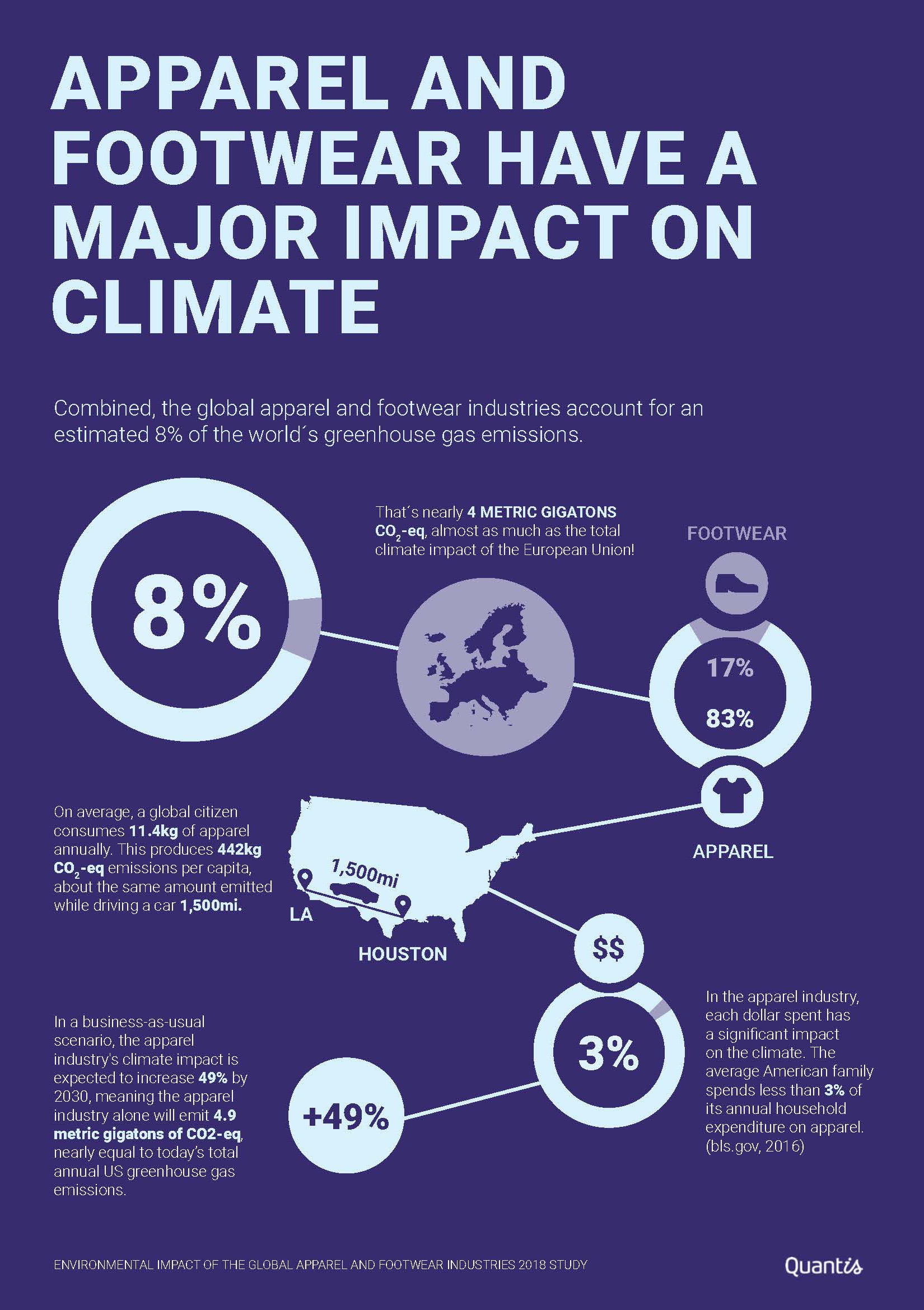San Francisco & Boston, US, February 27, 2018 – ClimateWorks Foundation, a non-governmental organization which mobilizes philanthropy to solve the climate crisis and ensure a prosperous future, together with the environmental sustainability experts and consultants at Quantis announce the release of the report, Measuring Fashion: Insights from the Environmental Impact of the Global Apparel and Footwear Industries study. The underlying study is the first of its kind to assess the environmental impacts of the global apparel and footwear industries. It considers the industries’ value chains across 7 stages - from fiber production/material extraction to end-of-life, and includes 5 different environmental indicators: Climate Change, Resources, Freshwater Withdrawal, Ecosystem Quality, Human Health.
“There is increasing pressure on fashion brands to demonstrate their sustainability. We have seen many assumptions being made about the actual environmental performance of the industry and its value chain, where the hotspots lie, and what the potential solutions may be,” Quantis senior sustainability consultant Annabelle Stamm explains. “We knew fashion’s impact was major, but we didn’t have the science-based metric view of what this really meant. This study enables us to answer some of these questions, bust some of our collective assumptions, and provide guidance to those committed to act,” she adds.
This groundbreaking study and the insights gained are critical to guide fashion brands and businesses that are committed to setting truly sustainable goals, to make science-driven decisions, helping implement effective and meaningful actions. Understanding environmental impacts, particularly on climate, is also necessary for fashion brands committing to the Science-Based Targets initiative to get their business aligned with the global objective to limit warming to 2°C.
The Measuring Fashion study is the first-of-its-kind for three reasons: 1/ Based on industry specific impact data from the World Apparel and Footwear Lifecycle Database, which makes it comprehensive, robust, and up-to-date; 2/ Uses a multi-indicator approach to assess different impact areas such as water use and ecosystem impacts alongside greenhouse gas emissions to ensure a balanced assessment on multiple fronts; and, 3/ Provides an outlook of the evolution of impacts across time (both past and future) and connects this with specific levers for change across the value chain.
Circularity by Design: How to Influence Sustainable Consumer Behaviors
Join us Thursday, December 5, at 1pm ET for a free webinar on making circular behaviors the easy choice! Nudge & behavioral design expert Sille Krukow will explore the power of Consumer Behavior Design to drive circular decision-making and encourage behaviors including recycling and using take-back services. She will share key insights on consumer psychology, behavior design related to in-store and on-pack experiences, and how small changes in the environment can help make it easy for consumers to choose circularity.
Fast facts from the Measuring Fashion report:
- Combined, the global apparel and footwear industries account for 8% of the world’s greenhouse gas emissions, almost as much as the total carbon impact of the EU.
- The apparel industry alone accounts for 6.7% of the world’s greenhouse gas emissions, with more than 50% coming from 3 phases: fiber production (15%), yarn preparation (28%), and the highest impact phase - dyeing & finishing (36%).
- In a business-as-usual scenario, apparel’s climate impact is expected to increase by 49% - equal to today’s total annual greenhouse gas emissions in the United States.
- 3 levers of change were identified – rethinking energy, disruptive reduction, and design for the future – and the report asks, “Is shifting to a circular economy enough?”
It is time for action, time for fashion to channel its innovative and creative approach toward the world’s most pressing challenge. Helen Picot, Buildings and Industry Portfolio at ClimateWorks Foundation, explains why this study will help:
“Clothing is a major part of our day-to-day consumption and we all know that fashion is getting faster and cheaper. But few consumers realize how much their new shirt or pair of shoes impacts their carbon and water footprint. This new research from Quantis and ClimateWorks Foundation reveals the most environmentally intensive links in apparel supply chains. These results can help brands, manufacturers and consumers make smarter choices about how to get on a more sustainable path.”
For more in-depth look at the study, access the Measuring Fashion: Environmental Impact of the Global Apparel and Footwear Industries study (full report and methodological considerations) here: http://www.climateworks.org/report/measuring-fashion-global-study/
STEERING COMMITTEE
Linda Greer, Senior Scientist, National Resource Defense Council:
"This unique study provides robust data on the environmental impacts of each step of the apparel supply chain. It directs focus to areas that matter the most so you don’t waste time on the small stuff. It empowers companies to step up and set ambitious, achievable science-based targets to reduce their climate impact."
Debera Johnson, Executive Director, Brooklyn Fashion + Design accelerator, Pratt Center for Sustainable Design Strategies:
"What we know is only valuable when it rubs up against what other people know. This report is an invaluable resource for making change."
La Rhea Pepper, Managing Director, Textile Exchange:
"You have to have good information to make sound decisions. This report provides a great perspective on ways that we, as a textile community, can take action. We can’t allow ourselves to be overwhelmed to paralysis; every small decision and individual action adds up. This will require new business thinking and engagement. Let’s make the wisest choices!"
March 28th at 5pm CET / 4pm GMT/ 11am EST / 8am PST.
Register here to join panelists from ClimateWorks Foundation, Quantis, and the NRDC to learn more about the study and how it will change the future of fashion.
SOCIAL SUPPORT
@ClimateWorks
@Quantis_intl

Get the latest insights, trends, and innovations to help position yourself at the forefront of sustainable business leadership—delivered straight to your inbox.
Sustainable Brands Staff
Published Feb 27, 2018 1pm EST / 10am PST / 6pm GMT / 7pm CET